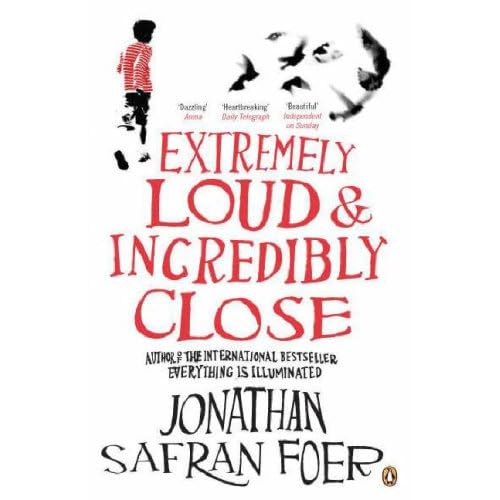It's been a week since I returned from Poland, and I completed my first book yesterday. I'm still waiting for the Iliad, but I did have Extremely Loud and Incredibly Close.

From the author of the book that inspired one of my favorite movies (Everything is Illuminated), Extremely Loud and Incredibly Close reminded me a bit of Slaughterhouse-Five in the way that it dealt with time.
Without giving too much away, there were a few quotes that I found particularly true and striking especially in consideration with recent events in my life and the lives of those close to me.
The first quote that I want to share deals with the title of this post, which is also a sticker I saw on UofL campus this past week. It reminded me that at times we give ourselves permission to not be outstanding in a literal sense; I have decided to try and live a life that I consider honest to my beliefs and morals in everything from living the gospel to boycotting Nestle products. At times, this is tiring and I have taken the approach of stepping back into the shadows and being, in some way, silent. I found this passage encouraging:
"... we were determined to ignore whatever needed to be ignored, to build a new world from nothing if nothing in our world could be salvaged, it was one of the best days of my life, a day during which I lived my life and didn't think about my life at all" (28). To me, this speaks of a willingness to persevere in affecting positive change around ourselves to the point where doing what feels most honest and right ceases to be a struggle and starts to become natural to us. While I think that progression is rarely comfortable, I think that is it possible to reach a state of mind where doing the best thing comes as second nature. I am trying to get there now.
I also think that, in a way, this quote speaks to the concern aired in the recent op-ed of the NYT by Friedman, who was quoting the Wall Street Journal's Seib stating that "'America and its political leaders, after two decades of failing to come together to solve big problems, seem to have lost faith in their ability to do so... A political system that expects failure doesn’t try very hard to produce anything else.'" One of the conversations that I had in Poland touched upon this issue on a very personal level, reminding me of something I'd once heard from a person I respect deeply. I think that it applies to everyone, but that doesn't make it less true. I won't quote directly, but I'll say it to you the way she said it to me. You need to start loving yourself to be able to love others better. The holes we have in our self-esteem make it difficult to let others in, but when you do everything in your life improves. Most importantly, once you are able to let others in, you must expect to be loved back. Unconditionally. Believing in your own potential is perhaps one of the most difficult and intimidating but essential and important things to do in life, especially at our age. If we expect failure (or mediocrity, or anything but excellence), we don't try very hard to produce anything else.
On a slightly different note, I loved this next passage - it filled me with the emotion that I feel at the end of a poignant film or even on a long layover in a foreign airport:
"I like to see people run to each other, I like the kissing and the crying, I like the impatience, the stories that the mouth can't tell fast enough, the ears that aren't big enough, the eyes that can't take in all of the change, I like the hugging, the bringing together, the end of missing someone, I sit on the side with a coffee and write in my daybook, I examine the flight schedules that I've already memorized, I observe, I write... being here fills my heart with so much joy, even if the joy isn't mine, and at the end of the day I fill the suitcase with old news."
I was taken with the way that the book deals with love and the human experience. There are some great one-liners (even better in context. read the book):
"We stopped laughing, I took the world into me, rearranged it, and sent it back out as a question: 'Do you like me?'"
"that's all anyone wants from anyone else, not love itself but the knowledge that love is there, like new batteries in the flashlight in the emergency kit in the hall closet." (which reminds me of the epic scene in Magnolia (which I saw when I thought I was seeing Steel Magnolias, which I was not, which is a story for another day) where the grown child star gets braces to impress the bartender and upon disappointment says "I have so much love to give. I just don't know where to put it." It might not sound moving, but it was heartwrenching in context).
"You cannot protect yourself from sadness without protecting yourself from happiness."
"Anyone who believes that a second is faster than a decade did not live my life."
"It's the tragedy of loving, you can't love anything more than something you miss."
I am going to finish this post, mostly because I'm afraid that I'm not doing this book justice. The following passages was one of the most moving that I read in the book; although I have been blessed to be isolated enough to have never seen war first-hand, but what I have seen in documentaries, photos, and art leaves my head echoing the closing line:
"INTERVIEWER. Did you see the mushroom cloud?
TOMOYASU. No, I didn't see the cloud.
INTERVIEWER. You didn't see the mushroom cloud?
TOMOYASU. I didn't see the mushroom cloud. I was trying to find Masako.
INTERVIEWER. But the cloud spread over the city?
TOMOYASU. I was trying to find her. They told me I couldn't go beyond the bridge. I thought she might be back home, so I turned around. I was at the Nikitsu Shrine when the black rain started falling from the sky. I wondered what it was.
INTERVIEWER. Can you describe the black rain?
TOMOYASU. I waited for her in the house. I opened the windows, even though there was no glass. I stayed awake all night waiting. But she didn't come back. About 6:30 the next morning, Mr. Ishido came around. His daughter was working at the same office as my daughter. He called out asking for Masako's house. I ran outside. I called, "It's here, over here!" Mr. Ishido came up to me. He said, "Quick! Get some clothes and go for her. She is at the bank of the Ota River."
I ran as fast as I could. Faster than I was able to run. When I reached the Tokiwa Bridge, there were soldiers lying on the ground. Around Hiroshima Station, I saw more people lying dead. There were more on the morning of the seventh than on the sixth. When I reached the riverbank, I couldn't tell who was who. I kept looking for Masako. I heard someone crying, "Mother!" I recognized her voice. I found her in horrible condition. And she still appears in my dreams that way. She said, "It took you so long."
I apologized to her. I told her, "I came as fast as I could."
It was just the two of us. I didn't know what to do. I was not a nurse. There were maggots in her wounds and a sticky yellow liquid. I tried to clean her up. But her skin was peeling off. The maggots were coming out all over. I couldn't wipe them off, or I would wipe off her skin and muscle. I had to pick them out. She asked me what I was doing. I told her, "Oh, Masako. It's nothing." She nodded. Nine hours later, she died.
INTERVIEWER. you were holding her in your arms all that time?
TOMOYASU. Yes, I held her in my arms. She said, "I don't want to die." I told her, "You're not going to die." She said, "I promise I won't die before we get home." But she was in pain and she kept crying, "Mother."
INTERVIEWER. It must be hard for you to talk about these things.
TOMOYASU. When I heard that your organization was recording testimonies, I knew I had to come. She died in my arms, saying, "I don't want to die." That is what death is like. It doesn't matter what uniforms the soldiers are wearing. It doesn't matter how good the weapons are. I thought if everyone could see what I saw, we would never have war anymore."
I do believe that there is much in our world to be salvaged, but I think that if we expect nothing but a repeat of history, if we accept the idea that war is inevitable, if we are content with living a life insulated from our potential to affect change, that is what we will have.
Being silent isn't being strong.

2 comments:
Just finished this book. Read it in a day and a half. Cried after the first 30 pages. So incredibly good. I read your post again after finishing it and was surprised to find we highlighted almost exactly the same passages and good quotes.
I particularly liked this one: "he was trying to find you, just as you'd tried to find me, it broke my heart into more pieces than my heart was made of, Why can't people say what they mean at the time?" (279) How much hurt could be avoided if we were just honest with each other all the time, shared our feelings and expressed out love?
this book changed me and moved me so much this summer (perhaps as evidenced by nuuuumerous references to it in my blog). i'm so glad you've read it, and i'm so glad you've posted about it.
Post a Comment